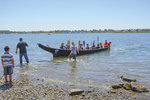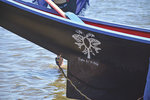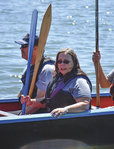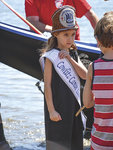



VANCOUVER – Ask a member of the Cowlitz Indian Tribe’s canoe family what the tribe’s annual Canoe Journey means to them and you’ll hear one thing repeated time and again: “It’s a spiritual journey.”
“It’s a way to let the Creator cleanse and renew and flow through you,” says Christine Hawkins, of Olympia, one of this year’s pullers for the Cowlitz tribe’s canoe journey – the canoe family participants are called pullers because they are “pulling” instead of “paddling” the traditional canoes.
On July 28, Hawkins and more than a dozen other Cowlitz canoe pullers took a day-long canoe trip to kick off the 2015 Youth Canoe Journey, which brings together tribes from across the Pacific Northwest together for a week of travel.
The Cowlitz canoe family hosted their own pre-canoe journey event on July 28, traveling from Stevenson to Vancouver, landing on the banks of the Columbia River near Old Apple Tree Park in Vancouver, then meeting for a luncheon and ceremonial blessing at Fort Vancouver National Historic Site.
On Wed., July 29, the Cowlitz canoe pullers traveled to Birch Bay in northern Washington, near the Canadian border, to meet with other Pacific Northwest tribes and begin the weeklong 2015 Youth Canoe Journey. From July 30 to Aug. 5, canoe pullers from several different tribes, including the NookSack, Lummi, Samish, Swinomish, Tulalip, Suquamish and Muckleshoot tribes, will travel from Birch Bay to Golden Gardens Park in Seattle.
After greeting his tribe’s canoe pullers at the Vancouver beach on July 28, Cowlitz Chairman William Iyall said that while the traditional inter-tribal canoe journeys always focus on family and community, this year’s canoe journey is specifically designed to honor the youth. Always important to any community, youth are especially important to the Cowlitz, a tribe that skews young, with more than 50 percent of its members age 18 or younger.
“The canoe journey shows our youth to have pride in our people and helps us build relationships with other tribes,” says Melody Pfeifer, the quality coordinator for the tribe’s Child Care and Development Program and a member of the Cowlitz canoe family. “It also teaches them (the youth) to work together. It’s very hard work, pulling the canoe, and when we’re pulling, we’re working together, as a family.”
Seventeen-year-old Josiah Welch is one of this year’s youngest canoe pullers for the Cowlitz tribe. Already an accomplished member of the tribe – Welch represented the Cowlitz at a meeting with President Barack Obama, Vice President Joe Biden and nearly 40 other indigenous youth from across the nation at a national event in 2014 – the young Cowlitz member says being a part of this canoe journey has given him a deep sense of peace.
“It is a spiritual cleansing,” Welch says. “If cleanses the negativity off of you … if you’re going through something, maybe depression or having a hard time with your parents’ divorce, something like that, this helps. If you’re spiritually hurt, you pull hard and find something deep inside yourself.”
Welch, who has been training with the other Cowlitz canoe family pullers for the 2015 Youth Canoe Journey for several months, says he feels a connection to his family and tribe when he’s out on the water.
“It feels like I’m traveling with my ancestors, that this is my home, this is where I’m supposed to be,” Welch says.
Devin Reck, this year’s chairman of the Cowlitz canoe family, agrees that the event – as well as the months-long training for the pullers – helps tribal members connect to each other and to their ancestors.
“We’ve been training for months, learning about cold water survival and training on different lakes,” Reck says.
This year, for the first time, the Cowlitz pullers trained on Coldwater Lake on Mount St. Helens.
“We believe that we were the first tribe to canoe on that lake,” Reck says. “It was formed after the blast, in 1980, and we don’t know of another tribe that has gone out (in a traditional canoe) on the lake, so that was a pretty neat event.”
Reck, whose wife and children are native Cowlitz, says the canoe journeys represent a way of life for many traditional native peoples. He points to the Ten Rules of the Canoe, a set of canoe puller guidelines developed in 1990 by the Quileute Canoe family for other native canoe pullers.
The 10 rules stress family and community over the individual, and reminds pullers that they all pull and support each other; that a hungry person has not charity – which is why the various tribes host potlucks at the end of each day’s canoe journey – that “respect and trust cannot exist in anger;” that every story is important; and that experiences are not enhanced through criticism.
The rules, says Reck, aren’t just good for canoe journeys. “They’re rules to live by,” he says.